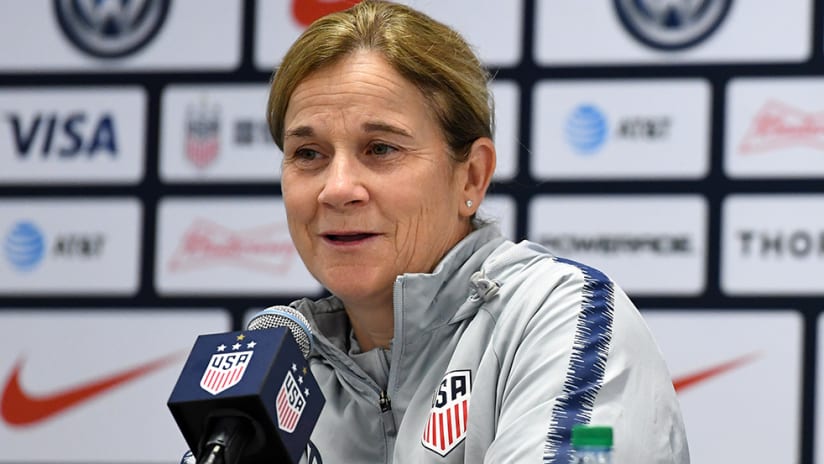Now that Ben Olsen has stepped aside from the head coaching role he occupied for a decade, D.C. United are pondering a new era during their 25-plus years of existence. They might just make a different kind of history with his successor, too.
Multiple media reports have confirmed that former US women’s national team boss Jill Ellis is on D.C.'s list of potential candidates for their vacancy. It’s mighty early, of course, in what we’re told will be a thorough and measured process. Still, the idea has quickly picked up popularity among the Black-and-Red faithful.
The two-time World Cup winner is a Beltway kid, having grown up (and won state championships) in D.C.’s Virginia suburbs before a distinguished collegiate career at William & Mary. She’s also an accomplished boundary-breaker who has matter-of-factly acknowledged that she’d be both interested in and qualified for the right job on the men’s side.
This would be quite a groundbreaking hire indeed, one that would reverberate way, way beyond the U.S. capital city or even MLS as a whole. I think it would be quite fair to compare it to Jackie Robinson's barrier-breaking impact on baseball. The likes of Becky Hammon and Katie Sowers are blazing trails in other major leagues and may yet reach the pinnacle of their profession, but Ellis would be the first to the summit.
And that carries both honor and responsibility, as well as great scrutiny and pressure for all involved. Would it spawn a future wave of female hires? Or might any on-field struggles steer other teams away from the idea?
North American soccer, like many sports, has traditionally been male-dominated, with opportunities only very rarely presented to women as head coaches or members of technical staffs. Not a single one of the dozens upon dozens of head coaches across MLS's history have been a woman, and the number of women in technical staffing roles has only recently been slowly increasing. There’s just one woman in charge across the three divisions of NCAA men's soccer, New York University's Kim Wyant, and she’s also the first. Even women's leagues are home to mostly male coaches; Sky Blue FC's Freya Coombe is the only woman among the NWSL's nine head coaches at present.
Nor have the opportunities been all that much more plentiful abroad. According to The Guardian, Helena Costa became the first female manager in the highest two divisions of any professional European league when French second-division side Clermont Foot hired her in 2014. Her tenure lasted a matter of weeks before walking away, citing a lack of professionalism among club executives who ignored her emails, signed players without her input and generally treated her appointment like a publicity stunt.
Clermont would hire Corinne Diacre as Costa’s replacement and the future French women’s national team manager spent three years at the helm. There are other inspiring examples around the world like Ireland's Lisa Fallon, Hong Kong's Chan Yuen-ting and former San Diego Loyal assistant Carrie Taylor. Yet those pioneering efforts very much remain the exception.
It’s certainly not the only walk of life in which the gender balance is skewed. Women comprise only 23.7% of the current U.S. Congress, and that’s an all-time high. On average, women still make cents on the dollar less than their male counterparts across the economies of both Canada and the U.S. Though the hows and whys of men’s soccer’s imbalance are a large conversation unto themselves, the sheer one-sidedness of the numbers over time tells the loudest story of all.
Everyone’s well aware of the problem by now, and many are eager to address it. Earlier this year The Athletic ran a long-form piece in which a range of figures around MLS expressed their support for the idea of a first woman head coach in the league. The general outlook of those interviewed, including Ellis and Olsen, was that there was no inherent problem to it, no unbridgeable gap between the two sides of the peoples’ game. The question is exactly how – and who, and where – change will finally begin.
Could Ellis at D.C. United work?
A lot has to fall into place for Ellis to wind up being D.C.’s final choice.
Between the reports of the past week and Olsen’s revelation back in March that United had previously considered offering her a place on his technical staff, we can feel confident that the club recognize her as a viable and desirable option. What many D.C. fans would quickly point out is that the reverse is also true: Their organization has work to do to impress Ellis.
United spent much of Olsen’s tenure treading water thanks to the long, bumpy and ongoing transition from their RFK Stadium to Audi Field eras. There’s a general recognition around the Black-and-Red that additional growth and investment is needed across several aspects of operations. Ellis, like most any other arriving coach, would likely have plenty of probing questions about the plans and ambitions.
A thoughtful, visionary type, Ellis is currently leading the push to grow the ranks of women coaches at all levels, headlined by U.S. Soccer’s new Jill Ellis Scholarship Fund and SheChampions Mentorship Program. She’s shown no sign of being in a rush to return to the technical area and has made clear that she doesn’t see working in the men’s game as an upgrade in and of itself. She has the luxury of taking her time and picking out the optimal situation for her next gig.
Ellis’s predecessor with the U.S. Women's National Team, Pia Sundhage, was once asked by a reporter whether she could coach a men’s team, provoking her memorable comeback: “Angela Merkel runs a whole f*ing country, clearly it works.” That sort of energy will probably be required for the MLS teams that are truly committed to forging into new territory in this department.













